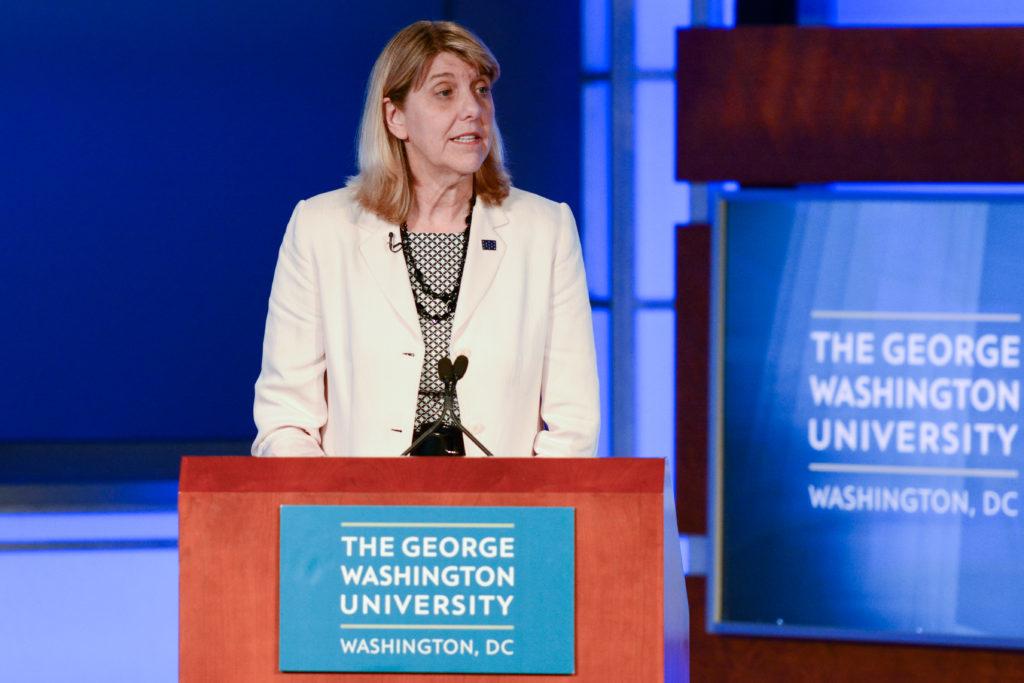Faculty said departing business school Dean Linda Livingstone put the school back on solid financial footing after a budget crisis.
When Livingstone, who was named Baylor University’s next president last week, came to GW three years ago, the school was reeling and its accreditation was in question after former Dean Doug Guthrie overspent the school’s budget by $13 million. Faculty said Livingstone brought a calming presence as the school tried to recover financially and build back its battered reputation.
Charles Garris, the outgoing chair of the Faculty Senate’s executive committee, said he saw a dramatic change in the atmosphere of the business school during Livingstone’s tenure.
“They were in a state of crisis,” he said. “She brought a sense of calm and tranquility.”
To repay the money the school owed the University, Livingstone planned to cut spending starting this year. She helped develop an eight-year repayment plan that began in 2015 and will not be completed when she leaves the University this summer.
Livingstone will also leave in the middle of the school’s $75 million fundraising campaign, part of the University’s larger $1 billion goal.
Like the start of her GW tenure, Livingstone will be walking into a complicated situation on day one at Baylor. The Texas university faces multiple Title IX investigations, and its last president was fired for mishandling sexual assault cases involving members of its high-profile football team.
Like the start of her GW tenure, Livingstone will be walking into a complicated situation on day one at Baylor.
Garris said Livingstone would be an ideal person to turn around the situation at Baylor because she has dealt with major issues at the business school and worked to improve staff morale. He said Livingstone’s work put the school in a better position to hire a qualified candidate to replace her.
“When Guthrie left the school was in shambles, and its very hard to get someone good,” Garris said. “Now the school’s in much better shape so they will probably get someone.”
Officials announced Friday that Vivek Choudhury, the associate dean for graduate programs at the business school, would serve as interim dean after Livingstone steps down in June. Officials have not announced when a search for a permanent dean will begin.
University spokesman Jason Shevrin said Livingstone was not available to comment for this story.
The school’s next dean could potentially be the first chosen by incoming University President Thomas LeBlanc, who will come to GW in August.
During her tenure, Livingstone developed a strategic plan that focused on taking advantage of the school’s location and expanding international outreach.
Livingstone opened a business program in South Korea and launched additional resources for international students in the campus career center, including special advisors to guide students through the visa process. Last year, the school was ranked No. 8 for international business by U.S. News and World Report.
James Bailey, a professor of development and management who was a member of the search committee that brought Livingstone to the University, said that when she started at GW, she had to immediately make decisions about the budget deficit. Livingstone was sensible in where she reduced spending and faculty didn’t notice the cuts, Bailey said.
“It didn’t impact your life in any specific way and it certainly had no impact on the quality of education or supporting faculty in their research,” Bailey said of the funding cuts.
Bailey said Livingstone had a level-headed attitude and confident demeanor that helped build unity among faculty.
“From an interaction standpoint, she just had the bearing of a leader,” Bailey said. “In a faculty meeting, one person might raise a point and another person might raise a point, but Linda was very good at connecting those points.”
Elias Carayannis, a professor of science, technology, innovation and entrepreneurship, said Livingstone focused on women’s empowerment through mentorship and hiring women in her time at the business school.
“For a dean to really make his or her mark it takes more than a couple of years.”
Livingstone appointed two female associate deans and enlisted the school in the Forte Foundation partnership, a commitment to help women in business compete for jobs in high-ranking leadership positions.
“She did mentor female faculty and certainly had strong faculty of her membership team,” Carayannis said. “She has been doing what she’s been preaching.”
Other faculty said Livingstone hadn’t been in her position long enough to accomplish major goals.
Robert Van Order, a professor of economics and finance, said Livingstone would have needed more time to make a significant mark at the school.
“For a dean to really make his or her mark it takes more than a couple of years,” Van Order said.
Another change in leadership
Livingstone will be the third business school dean to leave since 2010. Experts said the constant change in leadership could have an impact on the school’s ability to achieve its goals and recruit highly-qualified deans.
Jason Lane, a professor of higher education administration at SUNY Albany University, said turnover can create significant instability within a school.
Lane said uncertainty in leadership can make it more difficult to hire for lower level administrative and faculty positions because some feel uncomfortable with ambiguity in upper-level positions.
“When there is such continually churn in the senior leadership position, organizations tend to drift forward rather than move strategically,” Lane said.
Mitchell Chang, a professor of higher education and organizational change at University of California Los Angeles, said frequent leadership change can disrupt the priorities of a school’s strategic plan because deans cannot be held accountable for its success or failure.
“When this happens, the school will not only fall short of achieving the plan within the charted timeline but also, problems associated with needed changes could worsen,” he said in an email.
Ryan Meneses contributed reporting.





